C2G Advisory Group
The C2G Advisory Group was established to guide the initiative in its mission to catalyse the creation of effective governance for emerging climate technologies.
The Advisory Group is constituted from leading international experts covering a wide range of sectors and countries, selected to ensure deep insight into key issues relevant to achievement of the C2G mission.
Advisory Group members provide advice on the substantive issues behind the work of C2G. They provide independent strategic guidance and support to help ensure the initiative’s work is well informed, effective, and high impact. Members participate in the group in an individual, independent capacity and do not represent any specific organisation or institution. As the Advisory Group is not a decision-making body, the members have no direct and accountable influence over the work of the initiative.
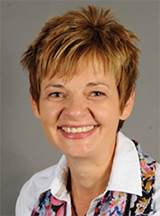
Maria Ivanova, Associate Professor of Global Governance, John W. McCormack Graduate School of Policy and Global Studies; Director of Center for Governance and Sustainability / USA, Bulgaria
Maria Ivanova is an international relations and global environmental governance scholar. Her research focuses on international environmental institutions and their performance, environmental sustainability, and the science-policy interface. She has researched and written extensively about the United Nations Environment Programme. She now studies the implementation of global environmental conventions and the policy processes around the Sustainable Development Goals, and along with her team has created the Environmental Conventions Index assessing countries’ performance across six global environmental conventions. She was a member of the Scientific Advisory Board of the UN Secretary-General created by Ban Ki-moon in 2012. She is a board member of the UN University Institute for the Advanced Study of Sustainability (UNU-IAS), the Global Young Academy, and the Millennium Institute, and an Andrew Carnegie Fellow. She serves as ambassador for the New Shape Prize of the Global Challenges Foundation.
Ivanova holds a PhD (with distinction) and two master’s degrees, in international relations and environmental management, from Yale University, and a bachelor’s degree from Mount Holyoke College.
“Governance is the design and execution of policy. Effective governance for climate geoengineering will require imagination and knowledge supported by systematic research, discussions, and deliberations.”
— Maria Ivanova
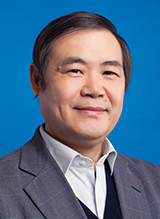
Pan Jiahua, Director-General of the Institute for Urban & Environmental Studies, Chinese Academy of Social Sciences / China
Pan Jiahua is currently Director-General of the Institute for Urban & Environmental Studies in the Chinese Academy of Social Sciences (CASS). He also holds the positions of Professor of economics at CASS Graduate School and Editor-in-Chief of the Chinese Journal of Urban & Environmental Studies.
He received a PhD from Cambridge University in 1992, studying the economics of sustainable development, energy and climate policy, world economy and environmental and natural resource economics. He worked for the UNDP Beijing Office as an Advisor on environment and development and was Lead author of the IPCC Working Group III 3rd, 4th, and 5th Assessment Reports on Mitigation.
He is a Member of the China National Expert Panel on Climate Change, the National Foreign Policy Advisory Group and is Advisor to the Ministry of Environment Protection. He is Vice President of the Chinese Association for Urban Economy and Vice President of the Chinese Society of Ecological Economists. He has edited and authored over 300 papers, articles and books in both English and Chinese.
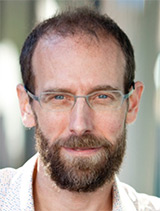
David Keith, Professor of Applied Physics and Professor of Public Policy, Harvard University / Canada, USA, UK
David Keith has worked near the interface between climate science, energy technology, and public policy for 25 years. He took first prize in Canada’s national physics prize exam, won MIT’s prize for excellence in experimental physics, and was one of TIME magazine’s Heroes of the Environment.
Keith is professor of applied physics in Harvard’s School of Engineering and Applied Sciences; professor of public policy in the Harvard Kennedy School; and founder at Carbon Engineering a company developing technology to capture of CO2 from ambient air to make carbon-neutral hydrocarbon fuels.
Best known for work on the science, technology, and public policy of solar geoengineering, Keith is developing an interfaculty research initiative on solar geoengineering at Harvard. Keith’s work has ranged from the climatic impacts of large-scale wind power to an early critique of the prospects for hydrogen fuel. Keith’s hardware engineering projects include the first interferometer for atoms, a high-accuracy infrared spectrometer for NASA’s ER-2, and currently, development of CO2 capture pilot plants for Carbon Engineering. Keith teaches courses on science and technology policy and on energy and environmental systems where he has reached students worldwide with an online edX course. He has writing for the public with A case for climate engineering from MIT Press. Based in Cambridge, Keith spends about a third of his time in Canmore Alberta.
“Solar geoengineering has the best chance of enabling social and environmental benefits if development of the technology and assessment of its risks and benefits proceeds hand-in-hand with the development of international governance.”
— David Keith
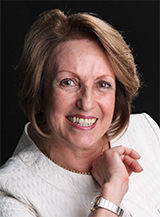
Thelma Krug, Vice-Chair, Intergovernmental Panel on Climate Change / Brazil
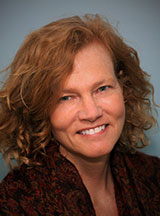
Amy Luers, Global Lead, Sustainability Science, Microsoft / United States of America
Amy Luers is the global lead for sustainability science at Microsoft Corporation. Previously, she served as executive director of Future Earth, assistant director for climate resilience and information at the White House in the Obama administration, director of climate at the Skoll Global Threats Fund, and senior environment manager at Google. Dr. Luers spent the first decade of her career working in Latin America, where she cofounded Agua Para La Vida, a nonprofit organization that works with rural communities to enhance access to potable water. Currently, she serves on the foresight committee of the Veolia Institute, and on the boards of several organizations including the Carnegie Climate Governance Initiative and the National Council for Science and the Environment. Dr. Luers is a member of the Council on Foreign Relations and previously served on committees of the United States Global Change Research Program and the National Academies of Sciences, Engineering, and Medicine. She has both a PhD in environmental science and MA in international policy studies from Stanford University, and a BS/MS in environmental systems engineering from Humbold State University, and BA in philosophy from Middlebury College. She has published widely on topics including societal vulnerability and resilience, climate impact and policy, science communication, and digitalization and sustainability.
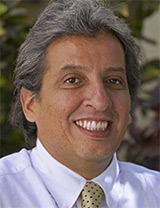
Manuel Pulgar-Vidal, Global Lead, Climate and Energy, WWF International / Peru
Manuel Pulgar-Vidal is leader of the Climate and Energy Practice of WWF International. He was formerly minister of state for environment in Peru and president of the United Nations Framework Convention on Climate Change (UNFCCC) Twentieth Conference of Parties (COP20).
Pulgar-Vidal is a lawyer with over 27 years of experience in the fields of environmental law and policy. In 1986, he founded the Peruvian Society for Environmental Law, one of the most recognized organizations of environmental law in the region, where he served as executive director for 20 years. In his role as minister of state for environment in Peru he was responsible for proposing and defining Peru’s environmental policies, including those covering biodiversity and climate change. He was also in charge of implementing the countries’ environmental legislation and its enforcement policies.
Throughout his career, Manuel Pulgar-Vidal has participated in the development of environmental policy frameworks in many countries in the region, as an advisor to decision makers and many project initiatives. He has also managed various organizations and is a recognized leader in environmental management issues. He has authored many papers and articles and is a professor and lecturer in environmental law, environmental management, and natural resources.
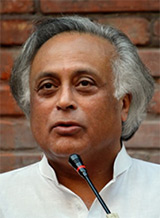
Jairam Ramesh, Member of Parliament / India
Jairam Ramesh is an Indian economist, author, and member of Parliament in the Indian National Congress.
He has represented Andhra Pradesh state in the Rajya Sabha (the Upper House of the Parliament of India) since June 2004 and has previously held various ministerial positions including: minister of rural development, minister of drinking water and sanitation, and minister of state at the Ministry of Environment and Forests.
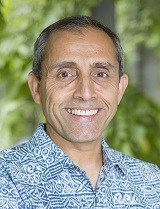
Ambuj Sagar, Vipula and Mahesh Chaturvedi Professor of Policy Studies, Department of Humanities and Social Sciences; Head, School of Public Policy, Indian Institute of Technology Delhi / India
Ambuj Sagar is the Vipula and Mahesh Chaturvedi Professor of Policy Studies and the founding Head of the School of Public Policy at the Indian Institute of Technology Delhi.
Ambuj’s interests broadly lie at the intersection of technology and development. His recent work has focused on innovation policy for meeting sustainability and inclusivity challenges, energy innovation policy and strategies (in areas such as biofuels, clean cookstoves, coal power, automobiles, and institutional mechanisms such as climate innovation centers), climate change policy and politics, capacity development, higher education policy, and the technology-society interface. He has been a consultant/advisor to various Indian Govt. ministries as well as many multilateral and bilateral agencies.
Ambuj did his undergraduate studies in Mechanical Engineering at IIT Delhi. He subsequently received an M.S. in Aerospace Engineering from the University of Michigan and then an M.S. in Materials Science, a Ph.D. in Polymer Science, and an M.S. in Technology and Policy from the Massachusetts Institute of Technology.
“While technologies are a powerful vehicle for addressing societal challenges, their deployment also can come with significant, often unanticipated, environmental, health, social, and other risks. There also is a possibility of a moral hazard where the existence of a technological ‘solution’ may then reduce or preclude efforts to reduce the underlying risk (or disregard many of the equity consequences of the technology’s deployment). Therefore an effort to start a deep ex-ante engagement with such issues in the context of geoengineering, which in many ways epitomizes many of these concerns, is timely and much needed.”
— Ambuj Sagar
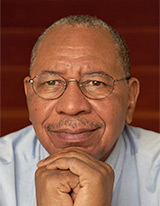
Youba Sokona, Special Advisor for Sustainable Development, South Centre / Mali
Youba Sokona is currently special advisor for sustainable development at the South Centre in Mali. With over 35 years of experience addressing energy, environment, and sustainable development in Africa, Sokona is a well-known, leading global figure.
In addition to these achievements, Sokona has a proven track record of organizational leadership and management, for example, leading the conception, development, and initiating of the Africa Renewable Energy Initiative, as coordinator of the African Climate Policy Centre (ACPC) and as executive secretary of the Sahara and the Sahel Observatory (OSS). Sokona’s advice is highly sought after, and as such, he is affiliated with numerous boards and organizations, including as a member of the board for the Institute of Development Studies (IDS), honorary professor at the University College London (UCL), member of Science Advisory Committee of the International Institute for Applied Systems Analysis (IIASA), and as a special advisor to the African Energy Leaders Group. In short, Sokona is a global figure, with deep technical knowledge, extensive policy experience, and an unreserved personal commitment to African led development.
“Exploring the unknown territory in the context of common good certainly prevents taking uninformed harmful decisions.”
— Youba Sokona
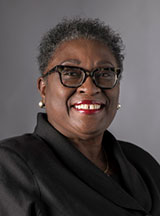
Elizabeth Thompson, Ambassador Extraordinary & Plenipotentiary with Responsibility for Climate Change, Small Island Developing States and Law of the Sea, Government of Barbados
Liz Thompson is a Barbadian who has worked in development policy for nearly 25 years. She is currently Barbados’ Ambassador Extraordinary & Plenipotentiary with Responsibility for Climate Change, Small Island Developing States and Law of the Sea. Prior to her current role she was Barbados’ Ambassador to the United Nations. She has previously served in a number of professional roles including as an elected Member of Parliament from 1994 to 2008 and as Minister of Government during this period. At various times, she held the portfolios of Energy and Environment, Housing and Lands, Physical Development and Planning, and Health. Liz also led Minority business in the Barbados Senate from 2008 to 2010.
From 2010 to 2012 she served as Assistant Secretary-General of the United Nations, with specific responsibility as one of two Executive Coordinators of the Rio+20 Conference on Sustainable Development. In this role she also developed the highly successful Higher Education Sustainability Initiative (HESI). Thereafter, she was engaged in a number of advisory roles within the UN system, including on the transition from the MDGs to the SDGs, in the Office of the UN Secretary-General, UNDP, the President of the General Assembly, and on the Secretary-General’s global energy initiative, Sustainable Energy for All (SE4ALL).
Liz has considerable experience in national and international policy and negotiations, including with international financial institutions and within the UN system and processes. As a minister she led major policy initiatives in Barbados such as the island’s national sustainable development, green economy, sustainable energy policies and the greening of government facilities. Her professional engagements have included consultancy in the Caribbean and internationally, to private sector entities, governments and UN agencies.
Liz has lectured and spoken in many countries and at universities such as Harvard, Yale, Colombia, the Universities of North Carolina, Waterloo and the West Indies on a number of issues in development, environment and energy. She has authored several papers and articles on these themes and is the co-author of two books on sustainable development published in 2014. She is certified in negotiations, alternative dispute resolution and arbitration, is an attorney at law (LLB and LEC) from the University of the West Indies and holds two Masters degrees, a general MBA with distinction from the University of Liverpool and an LLM in energy law, with minors in the law and policy of renewable energy and environment, from the Robert Gordon University.
Former Members
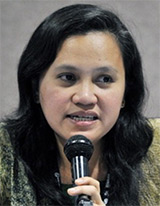
Neth Daño, Co-Executive Director, ETC Group / Philippines
Elenita “Neth” Daño is Asia director of the Action Group on Erosion, Technology and Concentration (ETC Group) based in Davao City, southern Philippines. ETC Group is an international civil society organization that monitors the impacts of new and emerging technologies on marginalized communities, tracks corporate concentration and governance in food and agriculture, and investigates erosion of biodiversity.
Neth earned her bachelor’s degree in Development Studies (cum laude) and graduate degree in Community Development from the University of the Philippines. She is a researcher who has done in-depth analysis and published work on various issues in agriculture, plant genetic resources, new technologies and climate change in developing countries, particularly in Southeast Asia. She represented environmental non-governmental organizations in the Advisory Board to the Climate Technology Centre and Network (CTCN), the operational arm of the Technology Mechanism of the UNFCCC, and in global environmental governance discussions at the UN. In 2016, she was appointed for a two-year term by the UN secretary-general in the 10-Member Group that supports the UN Technology Facilitation Mechanism (TFM).
“Because there is no Planet B, all deliberations and any decision on experiments or deployment of technologies that pose grave and unpredictable consequences to the planet and the people must involve civil society, social movements and potentially affected communities. The rights to Know and to say ‘No’ must be protected and respected at all times.”
— Neth Daño
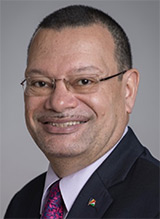
Ronald Jumeau, Permanent Representative to the United Nations and Ambassador for Climate Change / Tanzania, Seychelle
Ronald (Ronny) Jumeau was appointed Seychelles’ permanent representative (ambassador) to the United Nations and ambassador to the United States for the second time in March 2017.
He started his career as a journalist and then chief editor of the Seychelles Nation daily newspaper. He became secretary to the Cabinet in the Office of the President of Seychelles in 1992 before holding several ministerial posts from 1998 to 2007 including that of minister for environment and natural resources, which included responsibility for climate change, conservation, water, forestry, agriculture, and fisheries.
In 2007 Amb. Jumeau was appointed Seychelles’ permanent representative to the United Nations and ambassador to the United States, Canada, Brazil, Cuba, and several Caribbean islands until 2012, when he became his country’s New York-based roving ambassador for climate change and small island developing state issues.
He is a vice-president of the Assembly of SIDS DOCK, the Global Sustainable Energy Initiative for Small Island Developing States (SIDS), and a vice-chair of its executive council. He is also the alternate member of the Board of the Green Climate Fund (GCF), representing small island developing states (SIDS).
He was chair of the Steering Committee of the Global Island Partnership (GLISPA) from 2013 to 2015 and is currently a vice-chair, and was chief spokesperson of the Alliance of Small Island States (AOSIS) from 2012 to 2014.
“Isolated and vulnerable in the vastness of the oceans and seas that surround us and which we call home, Islanders need to know that somewhere out of sight, someone is not interfering with the climate in ways further detrimental to our survival.”
— Ronny Jumeau

Alessandra Orofino, Executive Director & Co-founder of Meu Rio / Brazil
Alessandra Orofino is executive director and co-founder of Meu Rio, a Brazilian civil society organization that develops tools for civic engagement and participation.
After working as a field researcher in Brazil and India, interviewing young girls who had been victims of domestic violence, Alessandra Orofino founded Meu Rio in 2011. The organization has fueled bottom-up local politics using a combination of on-the-ground actions and custom-designed online and mobile platforms and apps.
With a degree in economics and human rights from Columbia University, Orofino is a believer in participatory politics and in cities as the ideal locus for reinventing representative democracy, and with her team she has designed Meu Rio as a catalyst for youth activism. Among its 140,000 members are tens of thousands of millennials, identifying common issues, pooling ideas for solutions, and pressuring decision-makers to adopt new policies and practices.
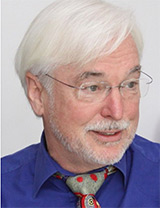
Steve Rayner, James Martin Professor of Science & Civilization, University of Oxford / UK
Steve Rayner was James Martin Professor of Science and Civilization and director of the Institute for Science, Innovation and Society (InSIS) in the School of Anthropology and Museum Ethnography at Oxford University, from where he also co-directed the Oxford Geoengineering Programme. He was a professorial fellow of Keble College. He was honorary professor of climate change and society at the University of Copenhagen from 2009-2014 and visiting professor at Flinders University from 2013-14. He was a senior fellow at the Breakthrough Institute of Oakland, California. He previously held senior research positions in two U.S. National Laboratories and taught at leading U.S. universities.
He served on various U.S., UK, and international bodies addressing science, technology and the environment, including Britain’s Royal Commission on Environmental Pollution, the Intergovernmental Panel on Climate Change and the Royal Society’s Working Group on Climate Geoengineering. From 2002-2008 he also directed the national Science in Society Research Programme of the UK Economic and Social Research Council. He was included in the 2008 Smart List by Wired Magazine as one of the 15 people the next U.S. president should listen to.
“Barring a global economic catastrophe, it does not seem credible that the world will meet its current target of limiting atmospheric warming by 2°C, let alone 1.5°C, through conventional mitigation alone. The feasibility and wisdom of deliberate interventions in the climate system to meet present goals raise fundamental issues about humanity’s relationship with climate, the goals that we set for ourselves, and the means by which we pursue them.”
— Steve Rayner
Steve Rayner sadly passed away in 17 January 2020.
Remembering Steve Rayner: the person who framed the geoengineering debate